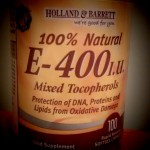 Vitamin E may play a beneficial role in the prevention of cardiovascular disease in humans. This may relate to the in vivo antioxidant actions of vitamin E, which are well reported. Vitamin E is a group of related isomers with vitamin E activity, and of these α-tocopherol is the most biologically active form. This relates to the affinity of α-tocopherol for the tocopherol transfer protein, which preferentially packages α-tocopherol into lipoproteins over other vitamin E isomers. Low intakes of vitamin E increase the rate of lipid peroxidation in plasma, and this may increase the risk of cardiovascular disease. In particular, vitamin E can may prevent the formation of artherosclerotic plaques through its ability to prevent peroxidation of low density lipoprotein. The Cambridge Heart Antioxidant Study was designed to test the hypothesis that high doses of α-tocopherol (400 or 800 iu per day) would reduce the risk of a combination of cardiovascular death and non-fatal myocardial infarction, and non-fatal myocardial infarction alone1. The study was not designed to examine dose response relations in terms of these primary endpoints.
Vitamin E may play a beneficial role in the prevention of cardiovascular disease in humans. This may relate to the in vivo antioxidant actions of vitamin E, which are well reported. Vitamin E is a group of related isomers with vitamin E activity, and of these α-tocopherol is the most biologically active form. This relates to the affinity of α-tocopherol for the tocopherol transfer protein, which preferentially packages α-tocopherol into lipoproteins over other vitamin E isomers. Low intakes of vitamin E increase the rate of lipid peroxidation in plasma, and this may increase the risk of cardiovascular disease. In particular, vitamin E can may prevent the formation of artherosclerotic plaques through its ability to prevent peroxidation of low density lipoprotein. The Cambridge Heart Antioxidant Study was designed to test the hypothesis that high doses of α-tocopherol (400 or 800 iu per day) would reduce the risk of a combination of cardiovascular death and non-fatal myocardial infarction, and non-fatal myocardial infarction alone1. The study was not designed to examine dose response relations in terms of these primary endpoints.
The results of this double-blind placebo-controlled study with random stratification showed that total mortality was slightly but not significantly greater in the α-tocopherol group, and that treatment had no effect on cardiovascular deaths. However the authors did find that α-tocopherol significantly reduced the rates of major cardiovascular events and of non-fatal myocardial infarction. In particular, high doses of α-tocopherol, reduced the risk of a combination of death and non-fatal myocardial infarction by 47 % and non fatal myocardial infarction alone by 77 %. Plasma levels of α-tocopherol increased on supplementation but did not increase in the placebo group, and plasma levels of total serum cholesterol were not affected by the treatment. The study design did not give the trial sufficient power for the authors to form conclusions about the reasons for the disparity in the treatment effects between cardiovascular death and non-fatal myocardial infarction. However, the authors did conclude that the extent of the risk reduction did indicate that the benefit may be due to more than one mechanism.
RdB
